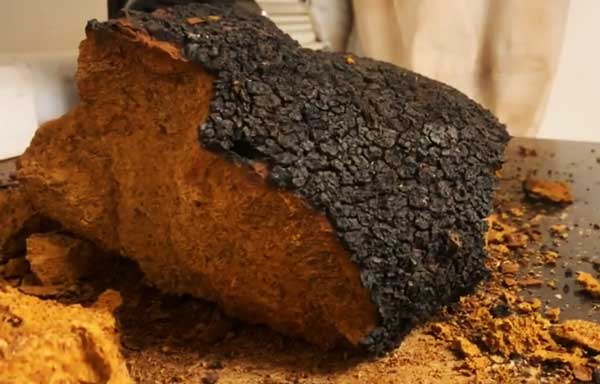Introduction– Chaga mushroom, also known as Inonotus obliquus, is fungus that grows on the bark of birch trees in Northern Europe, Siberia, Russia, Korea, Northern Canada, and northeastern United States.1 For hundreds of years, Chaga mushroom has been used by the Russians and the Northern Europeans to mainly boost immunity and overall health.1 Currently, Chaga mushroom is used as a dietary supplement for heart disease, diabetes, liver disease, liver cancer, lung cancer, and gastrointestinal cancer.2,3
What is cancer?
Cancer develops when the cells in the body begin to divide without stopping and spread into nearby tissues.4 Cancer cells can grow out of control and become invasive. Cancer can also spread from one site to another site in the body, resulting in metastatic cancer.4 There are currently over 100 types of cancer. Treatments for cancer include surgery, chemotherapy, radiation therapy, immunotherapy, targeted drug therapy, and hormone therapy.5
How does Chaga mushroom help with cancer?
It is not completely understood how Chaga mushroom prevents and fights cancer. The anticancer effect of Chaga mushroom may be due to its high content of antioxidants, which prevent cell damage caused by free radicals.1 when the body does not produce enough antioxidants, oxidative stress occurs. And, oxidative stress can lead to cancer.1
Several laboratory studies have been conducted to assess the efficacy of Chaga mushroom in cancer. A 2008 study investigated the anti-proliferative and apoptotic effects of Chaga mushroom in human liver cancer cells.6 The cells were treated with Chaga mushroom extract at concentrations of 250, 500, 750, and 1000 µg/ml for 48 hours. The study showed that Chaga mushroom extract inhibited the cell growth in a dose-dependent manner. In addition, Chaga mushroom extract triggered apoptotic cell death.
Chaga mushroom research

A 2009 study evaluated the antitumor activity of Inonotus obliquus against human colon cancer cells.7 The cells were treated with Inonotus obliquus at concentrations of 0.25, 0.5, and 1.0 mg/ml for 24 hours or 48 hours. The study demonstrated that Inonotus obliquus inhibited cell growth in a dose-dependent manner and this inhibition was accompanied by apoptotic cell death.
A 2016 study looked at the effect of Chaga mushroom on tumor suppression in mice with lung carcinoma growth and metastasis.8 The mice were treated with Chaga mushroom 6 mg/kg/day for 3 weeks. The study showed that the mice treated with Chaga mushroom achieved a 25% reduction in tumor size compared to the untreated mice. Mice with lung carcinoma metastasis had a 60% reduction in tumor size.
A 2018 study investigated the cytotoxic activity of Inonotus obliquus in four human lung adenocarcinoma cell lines.9 The study suggested that Inonotus obliquus extract reduced cell viability in all four cell lines by inducing apoptosis (programmed cell death).
And, lastly a 2011 study evaluated the anticancer effects of Chaga mushroom in human lung carcinoma, colon adenocarcinoma, rat glioma, and normal healthy cells.10 The study showed that Chaga mushroom decreased tumor cell proliferation, motility, and viability. Moreover, Chaga mushroom did not affect the normal healthy cells.
Read more: Mushroom benefits for healthy life
How do you take Chaga mushroom?
Chaga mushroom dietary supplement is made from the woody growth of the mushroom called conk.2 The supplement is available as powder, capsules, and liquid extract.1,3 Chaga mushroom is not approved as a drug by the Food and Drug Administration (FDA). It can be tough to figure out how much Chaga mushroom to take as there are no official recommended dosages. It is recommended to start with a low dosage and increase slowly until the desired effect is reached. And, before using Chaga mushroom, have a discussion with your healthcare provider to make sure it is safe and appropriate to use.
Safety of Chaga mushroom
No human studies have been done to determine the safety of Chaga mushroom.1 Chaga mushroom contains a chemical oxalate which can cause damage to the kidneys.2 Chaga mushroom may activate the immune system, so it should be used with caution in people with autoimmune diseases such as multiple sclerosis, lupus, and rheumatoid arthritis.2 The safety of Chaga mushroom during pregnancy and lactation has not been done yet, so it is best to avoid its use.1,2
Chaga mushroom may lower the blood glucose, so it can increase the risk of hypoglycemia in people taking diabetes medications.1,2 It contains a protein that is responsible for preventing blood clots, so it may increase the risk of bleeding if taken together with blood-thinning medications such as warfarin, aspirin, Plavix, heparin, and Lovenox.1,2 Since Chaga mushroom may make the immune system more active, taking it and immunosuppressants together may decrease the effectiveness of immunosuppressants.2
Conclusion
Chaga mushroom is used as a dietary supplement for liver cancer, lung cancer, and gastrointestinal cancer. It works by exerting its anti-oxidative effects to prevent free radicals from damaging the cells. Several laboratory studies demonstrated that Chaga mushroom inhibited tumor cell growth and caused programmed cell death. Extensive studies on humans need to be conducted to determine if Chaga mushroom prevents and fights cancers. If you are planning to use Chaga mushroom, please consult your healthcare provider to make sure it is safe and appropriate for you.
References:
- “What Are Chaga Mushrooms and Are They Healthy?” Healthline. https://www.healthline.com/nutrition/chaga-mushroom. Oct. 25, 2018. Accessed Oct. 28, 2020.
- “Chaga.” WebMD. https://www.webmd.com/vitamins/ai/ingredientmono-1474/chaga. Accessed Oct. 28, 2020.
- “The Health Benefits of Chaga Mushrooms.” Verywell Health. https://www.verywellhealth.com/what-can-chaga-do-for-you-89553#. Sept. 17, 2020. Accessed Oct. 28, 2020.
- “What is Cancer?” National Cancer Institute. https://www.cancer.gov/about-cancer/understanding/what-is-cancer. Feb. 9, 2015. Accessed Oct. 28, 2020.
- “Types of Cancer Treatment.” National Cancer Institute. https://www.cancer.gov/about-cancer/treatment/types. Accessed Oct. 28, 2020.
- Youn, Myung-Ja et al. “Chaga mushroom (Inonotus obliquus) induces G0/G1 arrest and apoptosis in human hepatoma HepG2 cells.” World journal of gastroenterology vol. 14,4 (2008): 511-7. doi:10.3748/wjg.14.511
- Lee, Sung Hak et al. “Antitumor activity of water extract of a mushroom, Inonotus obliquus, against HT-29 human colon cancer cells.” Phytotherapy research : PTR vol. 23,12 (2009): 1784-9. doi:10.1002/ptr.2836
- Arata, Satoru et al. “Continuous intake of the Chaga mushroom (Inonotus obliquus) aqueous extract suppresses cancer progression and maintains body temperature in mice.” Heliyon vol. 2,5 e00111. 12 May. 2016, doi:10.1016/j.heliyon.2016.e00111
- Baek, Jiwon et al. “Bioactivity-based analysis and chemical characterization of cytotoxic constituents from Chaga mushroom (Inonotus obliquus) that induce apoptosis in human lung adenocarcinoma cells.” Journal of ethnopharmacology vol. 224 (2018): 63-75. doi:10.1016/j.jep.2018.05.025
- Lemieszek, Marta Kinga et al. “Anticancer effects of fraction isolated from fruiting bodies of Chaga medicinal mushroom, Inonotus obliquus (Pers.:Fr.) Pilát (Aphyllophoromycetideae): in vitro studies.” International journal of medicinal mushrooms vol. 13,2 (2011): 131-43.


1 Comment
Comments are closed.